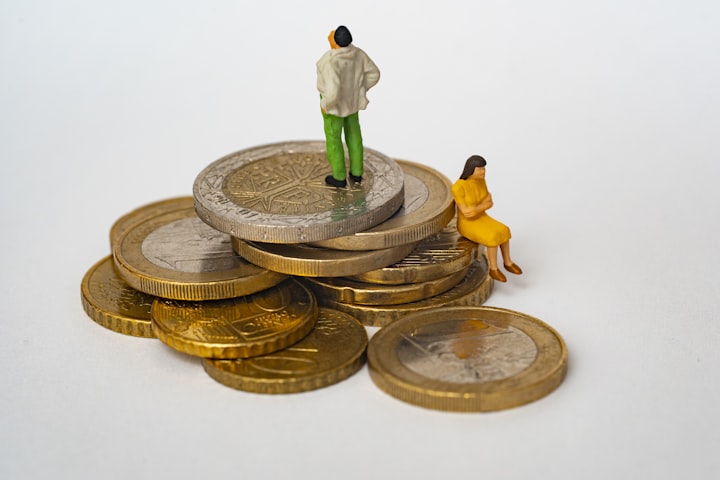
Surviving without money can be extremely challenging, but it is possible with the right mindset and skills. Here are some tips on how to survive without money:
1. Bartering:
Bartering is the exchange of goods or services without the use of money. It is a way for people to trade items or skills that they have for things that they need. Bartering has been used for centuries, and it can be a valuable tool for survival, especially when traditional currency is not available.
To barter effectively, you need to have something that others value. This could be a skill, such as carpentry, cooking, or sewing, or it could be a physical item, such as clothing, tools, or food. Once you have something that others want, you can offer it in exchange for something that you need.
Bartering can take place in person or online through various platforms such as websites or social media groups. Some communities even have organized bartering events where people come together to trade goods and services.
To barter successfully, it's important to be open-minded, flexible, and willing to negotiate. You should also be honest about the value of what you are offering and what you expect in exchange. Additionally, you should be aware of any regulations or laws related to bartering in your area.
Overall, bartering can be a great way to obtain necessary items or services without relying on money. It requires a bit of creativity, effort, and willingness to work with others, but it can be a rewarding and sustainable way to survive in challenging situations.
2. Self-sufficiency:
Self-sufficiency is the ability to provide for your basic needs without relying on outside sources or systems. It involves developing skills and knowledge to live a sustainable and independent lifestyle. Here are some ways to become more self-sufficient:
Grow your own food: You can learn how to grow vegetables, fruits, and herbs in a garden or in containers. This can provide you with a steady source of fresh, healthy food.
Raise animals: You can learn how to raise chickens, goats, or other animals for meat, eggs, or dairy products.
Learn basic survival skills: You can learn skills such as fire-making, shelter-building, and foraging for wild plants. This can help you survive in emergency situations or when resources are scarce.
Develop DIY skills: You can learn how to repair and maintain items such as clothing, furniture, and tools. This can help you save money and reduce waste.
Generate your own power: You can install solar panels or wind turbines to generate your own electricity. This can reduce your reliance on the power grid and lower your energy bills.
Becoming more self-sufficient requires effort, time, and a willingness to learn new skills. However, it can also be empowering and rewarding to know that you can provide for yourself and your family in a sustainable way.
3. Community support:
Community support is an important resource for people who are trying to survive without money. Here are some ways to access community support:
Food banks and meal programs: Many communities have food banks or meal programs that provide free or low-cost food to people in need.
Housing assistance: Some communities have shelters or other resources to help people who are homeless or at risk of becoming homeless.
Health care: Some communities have free or low-cost clinics that provide medical care to people who cannot afford it.
Community gardens: Some communities have gardens that are open to the public, where people can grow their own food and share resources.
Volunteering: Volunteering can be a way to give back to the community and access resources. By volunteering at a local organization or charity, you may be able to receive food, clothing, or other necessities.
Mutual aid groups: Mutual aid groups are communities of people who support each other by sharing resources and skills. They can provide help with basic needs such as food, housing, and health care.
Accessing community support can require some effort and research, but it can be a valuable resource for people who are struggling to survive without money. By reaching out to others and building connections, you can find support and resources that can help you meet your basic needs.
4. Volunteering:
Volunteering is a great way to give back to the community, meet new people, and gain new skills. It can also be a way to access resources and support when you are trying to survive without money. Here are some tips for volunteering:
Choose an organization that aligns with your values: There are many different types of organizations that rely on volunteers, so it's important to choose one that you feel passionate about and that aligns with your values.
Consider your skills and interests: Think about your skills and interests when choosing an organization to volunteer with. For example, if you enjoy working with children, you may want to volunteer at a local school or after-school program.
Be reliable: When you commit to volunteering, it's important to follow through and be reliable. This means showing up on time and completing tasks to the best of your ability.
Communicate with the organization: If you have any questions or concerns, it's important to communicate with the organization you are volunteering with. This can help ensure that you are making a meaningful contribution and that your needs are being met as well.
Take advantage of any benefits: Many organizations offer benefits to their volunteers, such as free meals or access to resources. Be sure to take advantage of these benefits if they are offered.
Overall, volunteering can be a rewarding and valuable experience, both for the organization you are volunteering with and for yourself. It can also be a way to access resources and support when you are trying to survive without money.
5. Simplify your life:
Simplifying your life is a way to reduce stress, focus on what's important, and live more sustainably. Here are some ways to simplify your life:
Declutter your space: Start by getting rid of things that you no longer need or use. This can help you create a more organized and peaceful living environment.
Practice mindfulness: Mindfulness is the practice of being present in the moment and fully engaged with what you are doing. This can help you focus on what's important and reduce stress.
Simplify your schedule: Take a look at your schedule and see if there are any activities or commitments that you can let go of. Simplifying your schedule can help you create more time for rest and relaxation.
Reduce your digital footprint: Consider taking a break from social media or other online activities that are taking up too much of your time and attention.
Buy less: Simplifying your life can also involve reducing your consumption of goods and services. Try to focus on buying only what you truly need and avoiding unnecessary purchases.
Practice gratitude: Focusing on the things you are grateful for can help you cultivate a more positive outlook and reduce stress.
Simplifying your life requires effort and a willingness to let go of things that may be holding you back. However, it can also be a way to create a more fulfilling and sustainable lifestyle that is focused on what's truly important.
How To Be Happier Without Spending a Lot of Money

Happiness is a state of mind, and it's not always dependent on money. There are many ways to boost your mood and well-being without breaking the bank. Here are some ideas:
Practice gratitude: Take time to appreciate the things you have in your life, no matter how small. Keep a gratitude journal and write down three things you're grateful for each day.
Spend time with loved ones: Connect with friends and family, plan a game night, or a picnic in the park. Spending time with people you care about can boost your mood and bring joy to your life.
Get outside: Take a walk in nature, go for a hike, or explore a new neighborhood. Fresh air and sunshine can improve your mental and physical health.
Exercise: Regular exercise has been linked to improved mood and reduced stress. Find an activity you enjoy, whether it's jogging, dancing, or yoga, and incorporate it into your routine.
Learn something new: Enroll in an online course, read a book on a new topic, or try a new hobby. Learning can be stimulating and fun.
Help others: Volunteering or helping others in need can give you a sense of purpose and fulfillment.
Practice mindfulness: Take a few minutes each day to meditate or practice deep breathing exercises. Mindfulness can help you feel more centered and calm.
Laugh more: Watch a comedy, spend time with friends who make you laugh, or read a funny book. Laughter is a natural stress reliever and can boost your mood.
Remember, happiness is a journey, not a destination. By incorporating these simple practices into your daily routine, you can cultivate a more positive outlook on life and find joy in the present moment.
I'm in Debt With No Job and No Money
Is any one has same situation!!
I'm sorry to hear that you're in a tough situation. Here are some steps you can take to start addressing your debt and financial situation:
Take stock of your debt:
Make a list of all the debts you owe and their interest rates. This will help you understand the full extent of your financial obligations.
Cut your expenses:
Look for ways to reduce your monthly expenses, such as canceling subscriptions or memberships you don't need, cooking at home instead of eating out, and cutting back on non-essential purchases.
Explore your options for income:
While you may not have a job at the moment, there may be other ways to bring in some income. Consider offering your skills or services as a freelancer, taking on odd jobs or gigs, or selling items you no longer need.
Reach out to your creditors:
Don't ignore your debt - reach out to your creditors and explain your situation. They may be willing to work out a payment plan or negotiate a settlement.
Seek assistance:
There are resources available to help you manage your debt and finances. Consider reaching out to a credit counseling agency or seeking assistance from a non-profit organization that offers financial assistance.
Remember, getting out of debt takes time and effort. But by taking steps to address your financial situation, you can start working towards a more stable and secure future.
Moneyless man reveals how to live a cashless life without Money?
Living a cashless life without money may seem like an impossible task, but it is actually something that some people are able to do. Here are some tips that a moneyless person might use to live a cashless life:
As I said, Previously...
Same Recap!!!!
Learn to live off the land: One way to live without money is to learn how to grow your own food, hunt, and gather wild edibles. This may require living in a rural area or having access to a community garden.
Use bartering and trading: Instead of using money to buy goods and services, you can try bartering and trading with others. This means exchanging goods or services that you have for things that you need.
Participate in a sharing economy: Many communities have sharing programs where people can borrow or share items like tools, books, and clothing. This can help you get the things you need without spending money.
Practice minimalism: Living a minimalist lifestyle means owning only the things that you need and eliminating excess. This can help you save money and live more sustainably.
Volunteer: Volunteering can be a way to exchange your time and skills for things that you need. For example, you could volunteer at a community garden and receive fresh produce in exchange.
Living without money is not easy, and it requires a lot of effort and creativity. However, it can also be rewarding and can help you live a more sustainable, community-oriented life.
10 Tips on How to Live a Happy Life without Money

Hacks for Happy Life with out Money:
Living a happy life without money may seem like a difficult task, but it is definitely possible. Here are ten tips on how to achieve this:
Focus on the positive: Instead of focusing on what you don't have, focus on what you do have. Cultivate an attitude of gratitude and appreciate the small things in life.
Connect with people: Building relationships with others can bring you a lot of joy and fulfillment. Spend time with loved ones, make new friends, and be kind to everyone you meet.
Pursue your passions: Engage in activities that bring you joy and fulfillment, whether it's painting, writing, or playing music. Pursue your passions and allow yourself to be fully immersed in them.
Practice mindfulness: Mindfulness is the practice of being present and aware in the moment. It can help you appreciate the simple pleasures in life and find joy in the present moment.
Take care of your health: Good physical and mental health are essential to happiness. Take care of your body by eating well, exercising, and getting enough sleep.
Volunteer: Giving back to others can be incredibly rewarding. Find a cause you're passionate about and volunteer your time and talents.
Get outside: Spending time in nature can be incredibly uplifting. Take walks in the park, go for a hike, or simply sit outside and soak up the sun.
Learn something new: Learning new things can bring a sense of accomplishment and fulfillment. Take up a new hobby, learn a new language, or enroll in an online course.
Practice gratitude: Make a habit of expressing gratitude for the good things in your life. Write down three things you're grateful for each day and reflect on them.
Simplify your life: Simplifying your life can help you focus on what's truly important. Declutter your home, reduce your possessions, and live a more minimalist lifestyle.
By implementing these tips, you can live a happy and fulfilling life, even without money. Remember, happiness is not about how much you have, but about how you choose to live.

Thanks for reading, You're welcome! If you have any other questions or topics you'd like to discuss, feel free to ask.





Comments
There are no comments for this story
Be the first to respond and start the conversation.